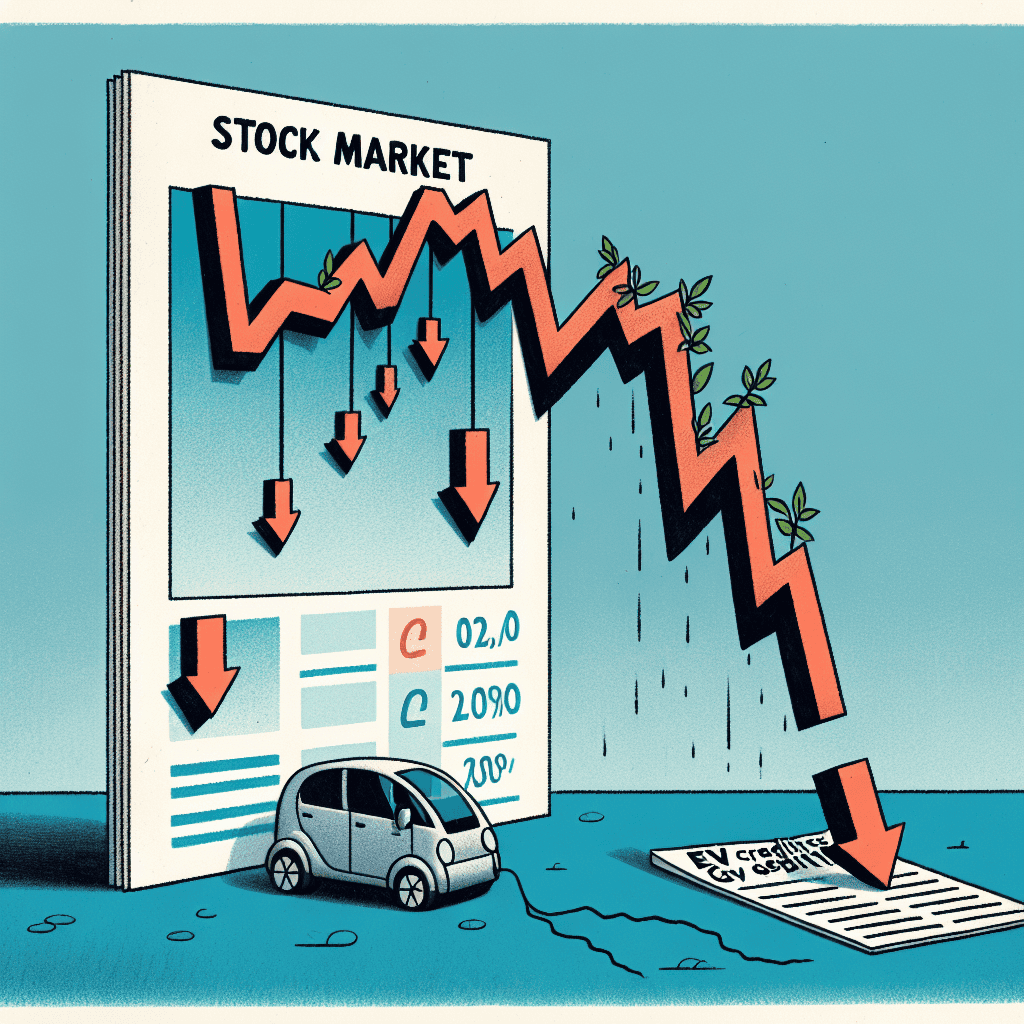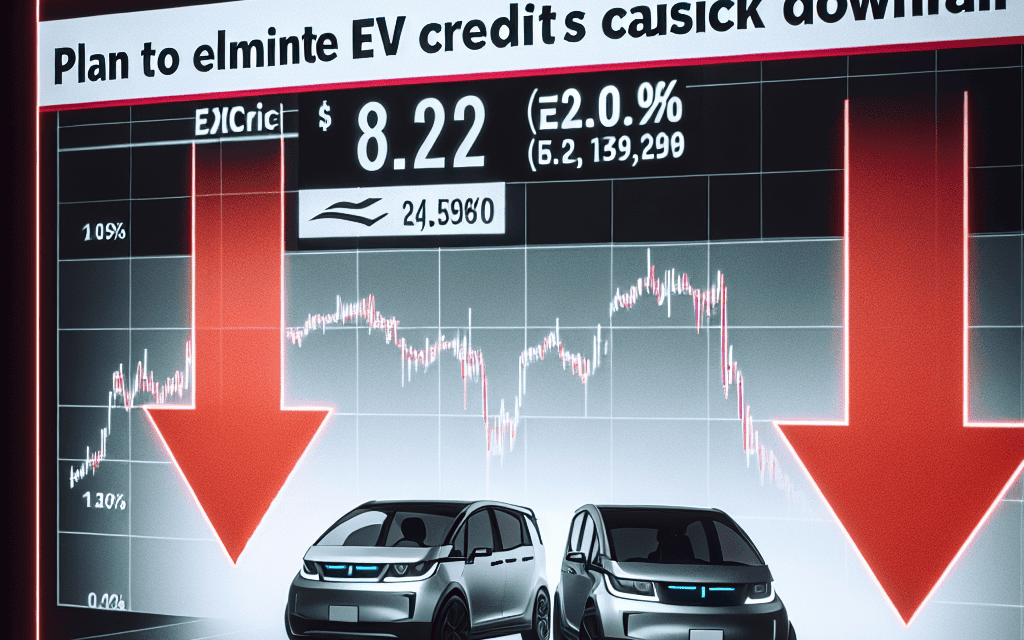“Market Jitters: Tesla and Rivian Shares Dip as EV Credit Faces Uncertainty Under Trump’s Proposal”
Introduction
Tesla and Rivian shares experienced a decline following reports that former President Donald Trump plans to eliminate the federal electric vehicle (EV) tax credit if re-elected. The EV tax credit, which provides consumers with financial incentives to purchase electric vehicles, has been a significant driver of growth for the EV market. Tesla, a leading electric vehicle manufacturer, and Rivian, a rising competitor in the industry, both rely on these incentives to make their vehicles more affordable and attractive to consumers. The potential removal of this credit raises concerns about the future demand for electric vehicles, impacting investor confidence and leading to a drop in the stock prices of these companies. This development highlights the ongoing political and economic challenges facing the EV industry as it seeks to transition away from traditional fossil fuel-powered vehicles.
Impact Of Trump’s EV Credit Elimination On Tesla And Rivian Shares
The recent decline in Tesla and Rivian shares has captured the attention of investors and market analysts alike, as reports emerged suggesting that former President Donald Trump plans to eliminate the federal electric vehicle (EV) tax credit if re-elected. This potential policy shift has significant implications for the EV market, which has been buoyed by government incentives aimed at promoting cleaner transportation alternatives. The federal EV tax credit, which can amount to as much as $7,500 per vehicle, has been a crucial factor in making electric vehicles more affordable for consumers. Consequently, the prospect of its elimination has raised concerns about the future demand for EVs, directly impacting the stock performance of leading manufacturers like Tesla and Rivian.
Tesla, a pioneer in the electric vehicle industry, has long benefited from the federal tax credit, which has helped to offset the higher upfront costs of its vehicles. The potential removal of this credit could lead to a decrease in consumer demand, as the financial incentive to switch from traditional gasoline-powered vehicles to electric ones diminishes. This concern is reflected in the recent dip in Tesla’s stock price, as investors weigh the potential impact on the company’s sales and revenue growth. Moreover, Tesla’s ambitious plans for expansion, including the development of new models and the construction of additional manufacturing facilities, could face challenges if consumer interest wanes due to higher effective prices.
Similarly, Rivian, a relatively new entrant in the EV market, is also feeling the pressure from the potential policy change. As a company that has positioned itself as a competitor to Tesla, Rivian relies heavily on the appeal of its electric trucks and SUVs to capture market share. The elimination of the federal tax credit could hinder Rivian’s ability to attract cost-conscious consumers, thereby affecting its growth trajectory. Investors are particularly sensitive to this issue, given Rivian’s status as a young company still in the process of scaling its production capabilities and establishing a foothold in the competitive automotive market.
In addition to the direct impact on consumer demand, the potential elimination of the EV tax credit could have broader implications for the electric vehicle industry as a whole. The transition to electric vehicles is a key component of global efforts to reduce carbon emissions and combat climate change. A reduction in government support for EVs could slow the pace of this transition, affecting not only manufacturers but also the entire supply chain, including battery producers and charging infrastructure developers. This interconnectedness underscores the importance of government policy in shaping the future of the automotive industry.
While the reports of Trump’s plan have yet to be confirmed, the market’s reaction highlights the sensitivity of the EV sector to policy changes. Investors and industry stakeholders will be closely monitoring developments in this area, as any definitive move to eliminate the tax credit could prompt a reevaluation of growth projections and investment strategies. In the meantime, both Tesla and Rivian may need to explore alternative strategies to maintain their competitive edge and continue driving the adoption of electric vehicles. As the situation unfolds, the broader implications for the EV market and the global push towards sustainable transportation remain to be seen.
Market Reactions: Tesla And Rivian Stock Performance Amid EV Credit News
In recent developments within the electric vehicle (EV) sector, shares of Tesla and Rivian have experienced a notable decline following reports that former President Donald Trump plans to eliminate the federal EV tax credit if re-elected. This potential policy shift has sent ripples through the market, causing investors to reassess the future landscape of the EV industry. The federal EV tax credit, which currently offers up to $7,500 to consumers purchasing electric vehicles, has been a significant driver in promoting the adoption of EVs across the United States. Consequently, the prospect of its removal has raised concerns about the potential impact on consumer demand and the broader EV market.
Tesla, a pioneer in the electric vehicle industry, has long benefited from the federal tax credit, which has helped make its vehicles more accessible to a wider range of consumers. The company’s stock, which has seen substantial growth over the past few years, reacted negatively to the news, reflecting investor apprehension about the potential decrease in demand for Tesla’s vehicles. Similarly, Rivian, a newer entrant in the EV market, has also felt the effects of this news. As a company still in its early stages of production and market penetration, Rivian relies heavily on incentives like the federal tax credit to attract customers and compete with established automakers. The potential elimination of this credit poses a significant challenge to Rivian’s growth trajectory and market strategy.
Moreover, the broader implications of this potential policy change extend beyond Tesla and Rivian. The entire EV industry could face headwinds as the removal of the tax credit might slow down the transition from traditional internal combustion engine vehicles to electric alternatives. This shift could hinder efforts to reduce carbon emissions and combat climate change, as the adoption of electric vehicles is a critical component of global sustainability initiatives. In addition to environmental concerns, the potential policy change could also impact the competitive dynamics within the automotive industry. Traditional automakers, who are increasingly investing in electric vehicle technology, may find it more challenging to justify these investments without the support of federal incentives. This could lead to a slowdown in innovation and a potential reallocation of resources away from EV development.
Furthermore, the market’s reaction to these reports underscores the sensitivity of the EV sector to policy changes and regulatory environments. Investors are acutely aware of the role that government incentives play in shaping the industry’s growth and are quick to respond to any potential shifts in policy. This highlights the importance of a stable and supportive regulatory framework for the continued advancement of electric vehicles. As the situation unfolds, stakeholders within the EV industry will be closely monitoring any developments related to the federal tax credit. Companies like Tesla and Rivian may need to reassess their strategies and explore alternative ways to maintain their competitive edge in a potentially less favorable market environment. This could involve increasing investments in cost-reduction technologies, expanding into new markets, or enhancing product offerings to appeal to a broader consumer base.
In conclusion, the recent decline in Tesla and Rivian shares serves as a reminder of the interconnectedness between government policy and market performance within the electric vehicle sector. As discussions around the future of the federal EV tax credit continue, the industry must remain agile and adaptive to navigate the challenges and opportunities that lie ahead. The outcome of these discussions will undoubtedly have far-reaching implications for the trajectory of the EV market and its role in shaping a sustainable future.
Future Of Electric Vehicles: Analyzing The Potential Policy Shift
The electric vehicle (EV) industry, a cornerstone of the global transition towards sustainable transportation, is currently facing a potential policy shift that could significantly impact its trajectory. Recently, shares of leading EV manufacturers Tesla and Rivian experienced a notable decline following reports that former President Donald Trump, a prominent figure in American politics, plans to eliminate the federal electric vehicle tax credit if re-elected. This development has sparked widespread discussion about the future of electric vehicles in the United States, a market that has been heavily influenced by government incentives designed to promote cleaner energy alternatives.
The federal EV tax credit, which offers up to $7,500 to consumers purchasing electric vehicles, has been a critical driver in making EVs more affordable and accessible to a broader audience. By reducing the upfront cost of electric vehicles, this incentive has played a pivotal role in accelerating the adoption of EV technology across the nation. Consequently, the potential removal of this credit raises concerns about the affordability of electric vehicles and the pace at which consumers might transition away from traditional internal combustion engine vehicles.
Tesla and Rivian, two of the most prominent players in the EV market, have been at the forefront of this transition. Tesla, with its innovative approach and widespread brand recognition, has consistently pushed the boundaries of what electric vehicles can achieve. Meanwhile, Rivian, a newer entrant, has garnered attention for its focus on electric trucks and SUVs, appealing to a segment of the market that has traditionally been dominated by gasoline-powered vehicles. Both companies have benefited from the federal tax credit, which has helped them expand their customer base and increase sales.
However, the potential elimination of this credit introduces a layer of uncertainty for these manufacturers. Investors, who closely monitor policy changes that could affect market dynamics, reacted swiftly to the news, leading to a decline in the stock prices of both Tesla and Rivian. This reaction underscores the significant influence that government policies can have on the financial health and strategic planning of companies within the EV sector.
Moreover, the broader implications of such a policy shift extend beyond individual companies. The removal of the EV tax credit could slow the overall growth of the electric vehicle market in the United States, potentially hindering efforts to reduce carbon emissions and combat climate change. As the transportation sector is a major contributor to greenhouse gas emissions, the transition to electric vehicles is seen as a crucial step in achieving environmental sustainability goals.
In light of these developments, stakeholders within the EV industry, including manufacturers, investors, and policymakers, are closely examining the potential impacts of this proposed policy change. While some argue that the market for electric vehicles has matured enough to withstand the removal of government incentives, others contend that continued support is necessary to ensure a smooth and rapid transition to a more sustainable transportation system.
As the situation unfolds, it remains to be seen how the potential policy shift will influence the future of electric vehicles in the United States. The outcome will likely depend on a complex interplay of market forces, consumer preferences, and political decisions. Nonetheless, the recent decline in Tesla and Rivian shares serves as a reminder of the critical role that government policies play in shaping the landscape of emerging industries, particularly those that are pivotal to addressing global environmental challenges.
Investor Concerns: How Policy Changes Affect Tesla And Rivian

The recent decline in Tesla and Rivian shares has sparked considerable discussion among investors and analysts alike, as reports emerged suggesting that former President Donald Trump plans to eliminate the federal electric vehicle (EV) tax credit if re-elected. This potential policy shift has raised concerns about the future of the EV market, which has been significantly bolstered by government incentives aimed at promoting cleaner transportation alternatives. As the EV industry continues to grow, understanding the implications of such policy changes is crucial for investors and stakeholders.
The federal EV tax credit, which provides up to $7,500 in tax relief for consumers purchasing electric vehicles, has been a pivotal factor in driving the adoption of EVs in the United States. By reducing the overall cost of EVs, the credit has made these vehicles more accessible to a broader range of consumers, thereby accelerating the transition from traditional internal combustion engine vehicles to more sustainable options. Consequently, any threat to this credit could potentially slow down the momentum that companies like Tesla and Rivian have built over the years.
Tesla, a pioneer in the EV market, has long benefited from the federal tax credit, which has helped it maintain a competitive edge in the automotive industry. The company has consistently pushed the boundaries of innovation, offering a range of vehicles that appeal to both environmentally conscious consumers and technology enthusiasts. However, the potential elimination of the tax credit could pose challenges for Tesla, as it may need to adjust its pricing strategy to remain attractive to consumers who are sensitive to cost. This could, in turn, impact Tesla’s profit margins and overall financial performance.
Similarly, Rivian, a relatively new entrant in the EV market, has positioned itself as a formidable competitor with its focus on electric trucks and SUVs. The company has garnered significant attention and investment, partly due to the favorable market conditions created by government incentives. Rivian’s growth strategy relies heavily on capturing a share of the burgeoning EV market, and the removal of the tax credit could hinder its ability to attract new customers. This potential policy change may force Rivian to reevaluate its business model and explore alternative strategies to sustain its growth trajectory.
Moreover, the broader implications of eliminating the EV tax credit extend beyond individual companies. The policy shift could slow the overall adoption of electric vehicles in the United States, potentially affecting the country’s ability to meet its climate goals. As the transportation sector is a significant contributor to greenhouse gas emissions, promoting the use of EVs is a critical component of efforts to combat climate change. Therefore, any reduction in incentives for EV adoption could have far-reaching consequences for environmental policy and sustainability initiatives.
In light of these developments, investors are closely monitoring the situation, as policy changes can significantly impact market dynamics and investment strategies. The uncertainty surrounding the future of the EV tax credit underscores the importance of staying informed about political developments and their potential effects on the industry. As Tesla and Rivian navigate this challenging landscape, their ability to adapt to changing policy environments will be crucial in maintaining their positions as leaders in the EV market. Ultimately, the outcome of this policy debate will shape the future of the electric vehicle industry and influence the investment decisions of stakeholders across the board.
Comparing Tesla And Rivian’s Strategies In A Changing EV Landscape
In recent developments within the electric vehicle (EV) industry, Tesla and Rivian have found themselves at the center of attention as their shares experienced a notable decline. This downturn comes amid reports suggesting that former President Donald Trump, should he return to office, plans to eliminate the federal EV tax credit. This potential policy shift has sparked discussions about the strategic approaches of these two prominent EV manufacturers in navigating an evolving landscape.
Tesla, a pioneer in the electric vehicle market, has long been a dominant force, leveraging its innovative technology and strong brand recognition. The company has consistently focused on expanding its production capabilities and enhancing its vehicle lineup to maintain its competitive edge. Tesla’s strategy has been characterized by its commitment to vertical integration, allowing it to control various aspects of production, from battery manufacturing to software development. This approach has enabled Tesla to achieve economies of scale and reduce costs, positioning it favorably in a market that is becoming increasingly competitive.
On the other hand, Rivian, a relatively new entrant in the EV space, has adopted a different strategy. The company has concentrated on carving out a niche in the electric truck and SUV segments, appealing to consumers seeking adventure and utility. Rivian’s emphasis on creating rugged, off-road-capable vehicles has set it apart from other EV manufacturers. Moreover, Rivian has strategically partnered with established companies, such as Amazon, to secure substantial orders and ensure a steady revenue stream. This partnership not only provides Rivian with financial stability but also enhances its brand visibility and credibility in a crowded market.
As the EV industry continues to evolve, both Tesla and Rivian face the challenge of adapting to potential policy changes that could impact consumer incentives. The federal EV tax credit has been a significant driver of electric vehicle adoption in the United States, making EVs more affordable for a broader range of consumers. The prospect of its elimination raises questions about how these companies will adjust their strategies to sustain growth and maintain market share.
Tesla, with its established brand and loyal customer base, may focus on further reducing production costs and enhancing its vehicle offerings to remain competitive. The company’s ongoing investments in battery technology and autonomous driving capabilities could serve as key differentiators, attracting consumers even in the absence of federal incentives. Additionally, Tesla’s global presence and expansion into international markets may help mitigate the impact of domestic policy changes.
Conversely, Rivian’s strategy may involve intensifying its efforts to build brand loyalty and expand its customer base. The company’s focus on unique vehicle features and its commitment to sustainability could resonate with environmentally conscious consumers, even without the allure of tax credits. Furthermore, Rivian’s partnerships and collaborations may play a crucial role in sustaining its growth trajectory, providing the necessary resources and market access to weather potential policy shifts.
In conclusion, the reported plans to eliminate the federal EV tax credit present a significant challenge for both Tesla and Rivian. However, their distinct strategies and market positions offer them different avenues to navigate this changing landscape. As the EV industry continues to mature, the ability of these companies to adapt and innovate will be critical in determining their long-term success. The evolving dynamics of the market, coupled with potential policy changes, underscore the importance of strategic agility and resilience in the face of uncertainty.
The Role Of Government Incentives In The EV Market
The electric vehicle (EV) market has been a focal point of innovation and investment over the past decade, with companies like Tesla and Rivian leading the charge in transforming the automotive landscape. However, recent reports suggesting that former President Donald Trump plans to eliminate the federal electric vehicle tax credit have sent ripples through the industry, causing shares of these companies to fall. This development underscores the significant role that government incentives play in shaping the EV market and influencing investor confidence.
Government incentives, particularly the federal EV tax credit, have been instrumental in promoting the adoption of electric vehicles in the United States. The credit, which can be as much as $7,500 per vehicle, effectively reduces the purchase price for consumers, making EVs more competitive with traditional gasoline-powered cars. This financial support has been crucial in encouraging consumers to make the switch to electric, thereby driving demand and enabling manufacturers to scale production and reduce costs over time.
The potential elimination of this credit raises concerns about the future growth trajectory of the EV market. For companies like Tesla and Rivian, which have been at the forefront of the electric vehicle revolution, the loss of this incentive could lead to a slowdown in sales. This is particularly significant for Rivian, a relatively new entrant in the market, which relies heavily on the credit to make its vehicles more accessible to a broader audience. Consequently, the prospect of losing this financial advantage has led to a decline in investor confidence, as reflected in the recent drop in their stock prices.
Moreover, the impact of removing the EV tax credit extends beyond individual companies. It could potentially slow the overall transition to electric vehicles, which is a critical component of global efforts to reduce carbon emissions and combat climate change. The transportation sector is a major contributor to greenhouse gas emissions, and accelerating the shift to electric vehicles is seen as a vital step in achieving environmental sustainability goals. Without government incentives, the pace of this transition could be significantly hindered, as consumers may be less inclined to choose electric vehicles over more affordable gasoline-powered options.
In addition to the environmental implications, the potential policy change could also affect the competitive dynamics within the automotive industry. While established automakers have begun to invest heavily in electric vehicle technology, new entrants like Tesla and Rivian have been able to carve out significant market share, partly due to the support provided by government incentives. The removal of these incentives could alter the competitive landscape, potentially favoring larger, more established companies that have the resources to absorb the impact of reduced consumer demand.
In conclusion, the reports of Trump’s plan to eliminate the federal EV tax credit highlight the critical role that government incentives play in the electric vehicle market. These incentives not only drive consumer adoption and support industry growth but also contribute to broader environmental and economic objectives. As the market continues to evolve, the interplay between government policy and industry dynamics will remain a key factor in shaping the future of electric vehicles. The recent fluctuations in Tesla and Rivian’s stock prices serve as a reminder of the sensitivity of the market to policy changes and the importance of maintaining a supportive regulatory environment to ensure the continued advancement of electric vehicle technology.
Long-term Implications For EV Manufacturers Without Federal Credits
The recent decline in Tesla and Rivian shares has sparked considerable discussion among investors and industry analysts, following reports of former President Donald Trump’s plan to eliminate federal electric vehicle (EV) credits if he is re-elected. This development has raised concerns about the long-term implications for EV manufacturers, which have relied on these incentives to bolster sales and encourage the adoption of electric vehicles. As the EV market continues to evolve, understanding the potential impact of such policy changes is crucial for stakeholders across the industry.
Federal EV credits have played a significant role in the growth of the electric vehicle market in the United States. By offering consumers a financial incentive to purchase electric vehicles, these credits have helped to offset the higher upfront costs associated with EVs compared to traditional internal combustion engine vehicles. Consequently, the elimination of these credits could lead to a decrease in consumer demand, posing a challenge for manufacturers like Tesla and Rivian, which have been at the forefront of the EV revolution.
Moreover, the potential removal of federal credits could have broader implications for the competitive landscape of the EV market. Established automakers, which have been gradually increasing their electric vehicle offerings, may find it more challenging to compete with Tesla, which has already achieved significant economies of scale and brand recognition. On the other hand, newer entrants like Rivian, which are still in the process of scaling up production and establishing a market presence, could face even greater hurdles in gaining traction without the support of federal incentives.
In addition to affecting consumer demand, the elimination of EV credits could also impact the pace of innovation within the industry. Federal incentives have not only encouraged consumers to adopt electric vehicles but have also driven manufacturers to invest in research and development to improve battery technology, increase vehicle range, and reduce costs. Without these incentives, the financial pressure on manufacturers could lead to a slowdown in innovation, potentially delaying the transition to a more sustainable transportation system.
Furthermore, the potential policy shift could have significant environmental implications. The transportation sector is a major contributor to greenhouse gas emissions, and the widespread adoption of electric vehicles is seen as a critical component of efforts to reduce these emissions and combat climate change. By making electric vehicles less accessible to consumers, the elimination of federal credits could hinder progress toward achieving national and global environmental goals.
Despite these challenges, it is important to consider the resilience and adaptability of the EV industry. Manufacturers have demonstrated a strong commitment to advancing electric vehicle technology and expanding their product offerings, even in the face of regulatory and market uncertainties. Additionally, state-level incentives and international markets may continue to provide opportunities for growth and innovation, helping to mitigate the impact of changes in federal policy.
In conclusion, while the potential elimination of federal EV credits presents significant challenges for manufacturers like Tesla and Rivian, it also underscores the importance of continued investment in innovation and the development of competitive strategies that do not rely solely on government incentives. As the industry navigates these uncertainties, stakeholders must remain vigilant and proactive in addressing the evolving landscape of the electric vehicle market.
Q&A
1. **What caused Tesla and Rivian shares to fall?**
Reports of former President Trump’s plan to eliminate the electric vehicle (EV) tax credit.
2. **What is the EV tax credit?**
A federal incentive that provides a tax credit to consumers who purchase electric vehicles, aimed at encouraging the adoption of EVs.
3. **How might eliminating the EV credit impact Tesla and Rivian?**
It could reduce consumer demand for their electric vehicles, as the financial incentive for purchasing EVs would be removed.
4. **Why is the EV credit important for EV manufacturers?**
It helps lower the effective cost of electric vehicles, making them more competitive with traditional gasoline-powered cars.
5. **What are the potential broader impacts on the EV market?**
A reduction in EV sales growth, slower adoption rates, and potential challenges for manufacturers in meeting production and sales targets.
6. **How have investors reacted to the news about the EV credit?**
Investors have reacted negatively, leading to a decline in the stock prices of companies like Tesla and Rivian.
7. **What could be the long-term effects if the EV credit is eliminated?**
It could slow down the transition to electric vehicles, impact the growth strategies of EV manufacturers, and potentially affect the overall push towards reducing carbon emissions in the transportation sector.
Conclusion
The decline in Tesla and Rivian shares following reports of former President Trump’s plan to eliminate the electric vehicle (EV) credit underscores the market’s sensitivity to policy changes affecting the EV industry. The potential removal of these incentives could hinder the growth trajectory of EV manufacturers by making their vehicles less financially attractive to consumers. This development highlights the critical role government policies play in shaping the competitive landscape of the automotive sector, particularly for companies heavily reliant on subsidies to drive sales and innovation. As a result, investors may reassess the valuation and growth prospects of EV companies, leading to increased volatility in their stock prices.





